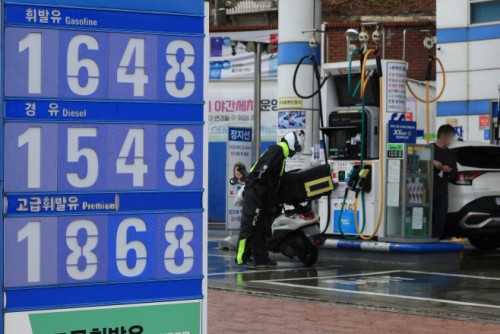 |
| Oil price information is displayed at a gas station in Seoul on April 15, when the government decided to extend the tax cut on fuel consumption for another two months./ Source: Yonhap |
By AsiaToday reporter Lee Ji-hoon
The government has decided to extend fuel tax cuts by two months until June amid rising global oil prices caused by the escalating tensions in the Middle East. This is because rising oil prices will make ordinary people’s livelihoods even more difficult, with continuing high prices of fruits and food items. If the tensions in the Middle East continue, the combination of high oil prices, high interest rates and high exchange rates are likely to hit the Korean economy.
“In an effort to prevent the growth of economic burdens on the people, the government will extend the tax cut and oil price-linked subsidies for diesel and compressed natural gas by another two months through the end of June,” Finance Minister Choi Sang-mok said during an emergency economic ministers’ meeting in Seoul on Monday.
As a result, the 25 percent discount on gasoline and 37 percent discount on diesel and liquefied petroleum gas will remain in place through June.
The government explained that the move is taken considering the burden on people’s livelihoods as the top priority. “The government will be a strong fence for the public to prevent people’s livelihoods from being shaken by external uncertainties,” Choi said. “The government’s policy of putting people’s livelihoods as the top priority is clearer than ever.”
However, the problem is the decrease in tax revenue due to the extension of the oil tax cut. After the COVID-19 pandemic, countries around the world began to stimulate the economy, raising international oil prices. The South Korean government implemented the first oil tax cut in November 2021. Since then, it has been extended a total of nine times, and the reduction in tax revenue is expected to reach trillions of won.
Besides, if the conflict between Israel and Iran is prolonged, the country’s economy is likely to face the combination of high oil prices, high interest rates and high exchange rates. International oil prices are already showing signs of a surge due to the instability of the Middle East situation. If the U.S. rate cut is delayed due to inflationary instability, it will inevitably deal a direct blow to households and businesses in Korea.
#fuel tax cut #extend #Middle East
Copyright by Asiatoday
Most Read
-
1
-
2
-
3
-
4
-
5
-
6
-
7





















